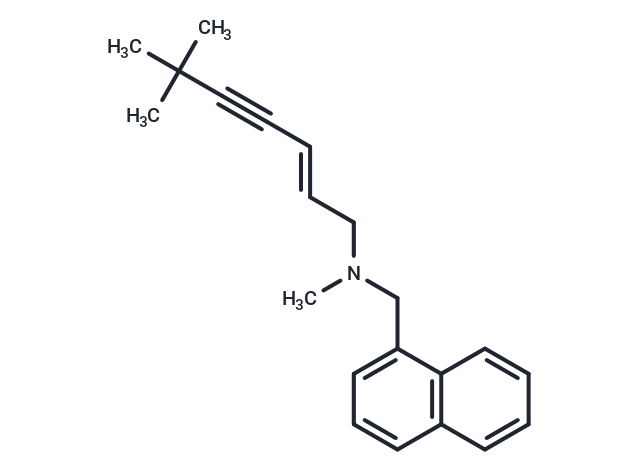Shopping Cart
- Remove All
 Your shopping cart is currently empty
Your shopping cart is currently empty

Terbinafine (TDT 067) is a synthetic allylamine derivative with antifungal activity. Terbinafine exerts its effect through inhibition of squalene epoxidase, thereby blocking the biosynthesis of ergosterol, an important component of fungal cell membranes. As a result, this agent disrupts fungal cell membrane synthesis and inhibits fungal growth.

| Pack Size | Price | Availability | Quantity |
|---|---|---|---|
| 50 mg | $38 | In Stock | |
| 100 mg | $46 | In Stock | |
| 200 mg | $79 | In Stock | |
| 1 mL x 10 mM (in DMSO) | $50 | In Stock |
| Description | Terbinafine (TDT 067) is a synthetic allylamine derivative with antifungal activity. Terbinafine exerts its effect through inhibition of squalene epoxidase, thereby blocking the biosynthesis of ergosterol, an important component of fungal cell membranes. As a result, this agent disrupts fungal cell membrane synthesis and inhibits fungal growth. |
| Targets&IC50 | SE:30 nM(Ki) |
| In vitro | Terbinafine (50 μM to 100 μM) inhibits only marginally the metabolism of ethoxycoumarin (CYP1A2), tolbutamide (CYP2C9), or ethynylestradiol, CsA, and cortisol. Terbinafine proves to be a potent inhibitor of the CYP2D6-mediated dextromethorphan O-demethylation and bufuralol 1-hydroxylation with IC50values of 0.2 μM and 0.25 μM, respectively. [1] Terbinafine is highly activ Aspergillus isolates (minimum inhibitory concentration [MIC] 0.01 to 2 mg/mL) with a primary fungicidal action (minimum fungicidal concentration [MFC] 0.02 to 4 mg/mL). [2] Terbinafine inhibits dextromethorphan O-demethylation with an apparent Ki ranging from 28 to 44 nM in human hepatic microsomes and averaging 22.4 nM for the heterologously expressed enzymes. [3] Terbinafine shows a very strong activity in vitro against Penicillium spp., Paecilomyces spp., Trichoderma spp., Acremonium spp. and Arthrographis spp. with GMs <1 mg/L. [4] Terbinafine decreases the levels of phosphorylated extracellular signal-regulated kinase (ERK). Terbinafine might cause a decrease of MEK, which in turn up-regulates p53 through the inhibition of ERK phosphorylation, and finally causes an increase of p21expression and cell-cycle arrest. [5] |
| In vivo | Terbinafine demonstrates efficacy not only when administered topically but also shows remarkable effectiveness in treating experimental dermatophytoses upon oral administration. In fungal-infected guinea pigs, there is a significant reduction in skin temperature following the fourth dose of terbinafine[6]. |
| Alias | Terbinex, TDT 067, SF 86-327, Lamisil |
| Molecular Weight | 291.43 |
| Formula | C21H25N |
| Cas No. | 91161-71-6 |
| Smiles | CN(C\C=C\C#CC(C)(C)C)CC1=CC=CC2=C1C=CC=C2 |
| Relative Density. | 1.007 g/cm3. Temperature:20 °C. |
| Storage | store at low temperature | Powder: -20°C for 3 years | In solvent: -80°C for 1 year | Shipping with blue ice/Shipping at ambient temperature. | ||||||||||||||||||||||||||||||||||||||||
| Solubility Information | Ethanol: 58 mg/mL (199.02 mM), Sonication is recommended. H2O: < 1 mg/mL (insoluble or slightly soluble) DMSO: 16.67 mg/mL (57.2 mM), Sonication is recommended. | ||||||||||||||||||||||||||||||||||||||||
Solution Preparation Table | |||||||||||||||||||||||||||||||||||||||||
DMSO/Ethanol
Ethanol
| |||||||||||||||||||||||||||||||||||||||||

Copyright © 2015-2025 TargetMol Chemicals Inc. All Rights Reserved.